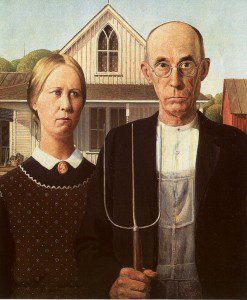This was originally posted last year, but it’s on my mind again today…
Reading a “secular” textbook this morning about the roots of Americans’ tendency to define themselves by the work they do and came across this:
“Calvin’s doctrine of predestination led his followers [to view] success in work…as a visible sign that one was predestined to eternal life. This view of work resulted in the notion that one was obligated by God to achieve the highest possible, and most rewarding, occupation. As a result, striving for upward mobility became morally justified. Thus, the Reformation brought about the view of work labeled as ‘the Protestant work ethic’. The value attached to hard work, the need for all persons to work, and the justification of profit emerging for Calvinism would eventually form the basis of modern capitalism and industrialism.” (Niles and Harris-Bowelsby, 2002).
Whether we identify as Christian, Wiccan, Atheist, Agnostic, Jewish, Hindu, Muslim or New Ager, most Americans have embraced these principles to one degree or another when it comes to work. Wondering your thoughts on this. Have you considered our cultural predisposition to “more is better” to be rooted in Calvinism? Does this perspective on work hold up in the 21st century? Should it?
Niles, S.G. & Harris-Bowlesby, J. H. (2002). Career development interventions in the 21st century. Merrill Prentice Hall: New Jersey.
